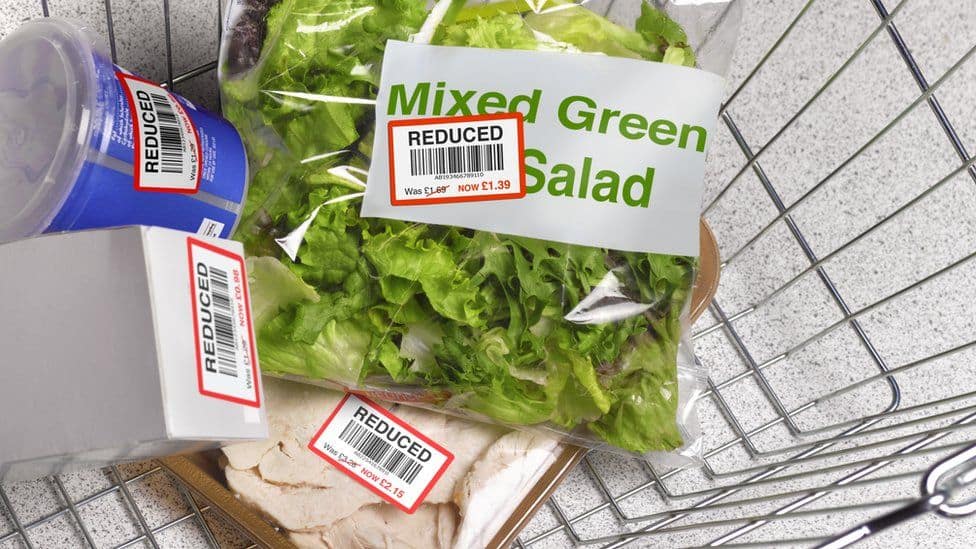As price rises bite into budgets, many people are cutting back on the weekly food shop.
As well as buying less, people are looking for ways to make their money go further. The BBC spoke to money bloggers for their tried and tested tips.
1. Choose the right supermarket
Rosie Forshaw runs Instagram account Money Saving Rosie. She says that trying to find the cheapest shop isn’t always straightforward.
There are quite a few apps you can download that compare prices on individual items, she says, but prices will be changing all the time depending on what you’re after.
Lynn Beattie, from the Mrs Mummypenny blog, says not everyone has the time to constantly check comparison apps or go to lots of different shops to get the cheapest deals.
“I just think people want to go to one place and get the shopping done and get the best deals in one place,” she says.
Both suggest choosing a supermarket that is cheap overall and keeping an eye out for local promotions. Consumer group Which? has a monthly price-comparison tracker, and local groups and bloggers on social media – and bigger sites like MoneySavingExpert – often highlight good deals.
2. Know what you already have
Rosie suggests taking a good look at your cupboards before each shopping trip. “We all know the value of making a list, but if you’re adding to what you’ve already got in your cupboards, then you’re going to spend money on things you don’t need,” she says.
“There’s no point in buying more jars of pasta sauce if you’ve already got five of them in the cupboard.”
She keeps a list of what’s in her cupboards in a notebook, so she always knows what she already has when she goes shopping. She says it has helped bring her weekly food shop for her, her husband and one-year-old son down to around £40.
3. Head for the reduced section first
Lynn recommends changing how you shop when you walk into a store and to head straight for the reduced section. “If you spot something there that’s on your list, you can tick that off and you’ve already saved some money,” she says.
She suggests then going straight to the frozen-foods section, and then the canned-produce aisle.
“Frozen meat, fish and vegetables will almost always be cheaper than the fresh option,” she says. “If you get what you need from there before going on to the fresh produce aisles, you’re likely to make significant savings.”
4. Make better use of your freezer
According to sustainability charity Wrap, the average household wastes around £700 every year by throwing food away. Lynn says making better use of her freezer has helped her cut down dramatically on waste.
“If things are getting close to their use-by date you should always try to freeze them,” she says. “You’ll also be able to buy things cheaper in supermarkets that are close to their sell-by date. Things like milk and cheese, even fruit and vegetables, can all be frozen and kept for when you need them.”
More on the basics of freezing can be found on the Food Standards Agency website.
Kate Hall, who runs The Full Freezer website, uses her freezer as a pause button rather than a long-term storage solution. She says that while almost all foods can be frozen, you do have to change the way you use them.
“You can’t defrost a banana or salad and expect it to be the same as when it went into the freezer,” she explains. “But if you think about how you could use it in puddings or in soups or in casseroles, then you’re going to save a lot of money.”
5. Understand packaging
Rosie says that a lot of what we buy in the supermarket is packaged for their convenience and not ours. “How often have you bought a tray of mushrooms covered in cling film only to have them go off in their packaging? They’re wrapped up like that to make them easier to transport,” she explains.
She puts hers in a paper bag when she gets them home but says just taking off the plastic wrapping will help them last longer.
Helen White, from Wrap, which runs the Love Food Hate Waste campaign, says there are small things we can do to make food last longer, especially fresh vegetables and salads – the UK’s most wasted food group.
“Just putting a piece of kitchen roll into an open bag of salad to absorb moisture is going to help it last longer,” she says.
Keeping fruit in the fridge will help it last longer, but she suggests checking that the temperature is set to below 5°C. “We think millions of UK fridges are at least two degrees too warm,” she says. “This is bad news for milk and other food items kept in the fridge, which can go off [more quickly] when not stored at the right temperature.”
6. Make use of experts
Rosie tries to use local, smaller retailers a lot to tap into their years of experience.
“Butchers are a great resource and someone we shouldn’t be afraid to talk to about saving money,” she says. “If you go into your local butcher and tell them you’ve only got £8 for your meat for the week, they’ll be able to tell you how to stretch your money by buying the cheapest cuts.
“They’re the best people to advise on how to cook them and how to make them go further.”

